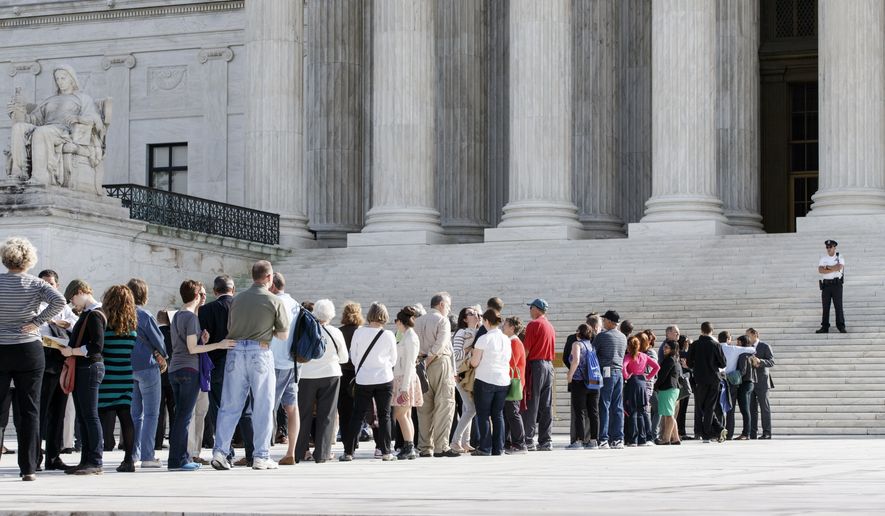The U.S. Supreme Court denied a petition Tuesday from three D.C. drug defendants serving lengthy prison sentences for dealing minor amounts of cocaine, but three justices disagreed — arguing the court missed a key opportunity to rule on an important Sixth Amendment issue.
The men — Desmond Thurston, Joseph Jones and Antwuan Ball — were convicted of dealing small amounts of crack cocaine but acquitted of major racketeering and conspiracy charges after a long trial in U.S. District Court in the District.
While they were acquitted of the most serious charges, for sentencing purposes, U.S. District Judge Richard W. Roberts disagreed with the jury’s verdict. He found that all three had taken part in a conspiracy in the Congress Park neighborhood in Southeast Washington.
The judge’s finding drastically increased the sentences compared to the guideline recommended prison terms if the men had been sentenced for the drug dealing offenses alone.
The lawyer for one of the defendants, Joseph Jones, told an appeals court last year that his client was serving 17 years based on two street-level drug deals worth a combined $35. Ball received 18 years in prison after his conviction on a $600 crack cocaine deal with an undercover cooperator.
While the court rejected the petition from Jones and his co-defendants, three justices disagreed in a sharply worded dissent that argued that it was unconstitutional for defendants to serve unreasonably long sentences based on facts found by a judge, not a jury.
SEE ALSO: Appeals court upholds D.C. man’s 18-year sentence for $600 drug deal
“We have held that a substantively unreasonable penalty is illegal and must be set aside,” Judge Antonin Scalia wrote in a dissent that included Justices Ruth Bader Ginsburg and Clarence Thomas.
“It unavoidably follows that any fact necessary to prevent a sentence from being substantively unreasonable — thereby exposing the defendant to the longer sentence — is an element that must be either admitted by the defendant or found by the jury. It may not be found by a judge.”
Justice Scalia said the court could have made the finding years ago in another case, Rita v. US, but left it for “another day.”
He said that day had arrived in the Jones case.
“The present petition presents the nonhypothetical case the court claimed to have been waiting for. And it is a particularly appealing case, because not only did no jury convict these defendants of the offense the sentencing judge thought them guilty of, but a jury acquitted them of that offense,” Justice Scalia wrote.
Among those who backed the petition were the Cato and Rutherford institutes, which filed briefs urging the justices to take up the case over concerns about what they called “carte blanche” powers being given to federal judges.
SEE ALSO: ‘Juror No. 6’ stirs debate on sentencing
But Solicitor General Donald Verrilli Jr. argued that, unlike juries, which must find facts beyond a reasonable doubt, judges need only make findings based on a preponderance of the evidence.
The government says sentencing guidelines are advisory, not mandatory, and the statutory range for distribution of 5 or more grams of crack cocaine is five to 40 years.
The Ball case was the subject of a series of articles in The Washington Times in recent years. The case was notable because it offered a rare glimpse into the perspective of a juror on sentencing. Retired federal economist Jim Caron wrote a letter to Judge Roberts after he found out prosecutors were seeking lengthy prison sentences for the defendants.
“It seems to me a tragedy that one is asked to serve on a jury, serves, but then finds their work may not be given the credit it deserves,” Caron wrote in his letter. He died a few weeks later.
• Jim McElhatton can be reached at jmcelhatton@washingtontimes.com.




Please read our comment policy before commenting.